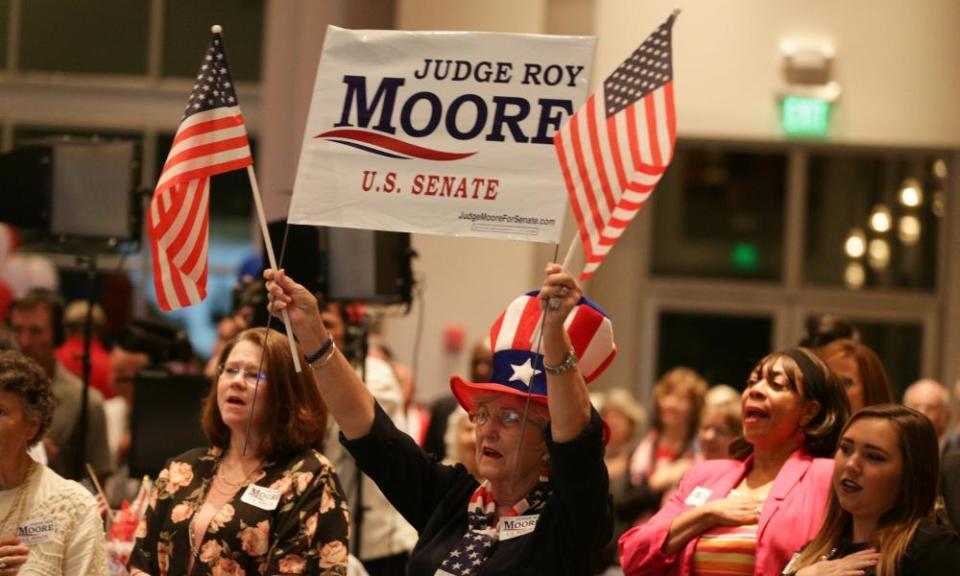Roy Moore's Alabama Senate win may not be a sign of a rightwing uprising
Moore’s victory may give fellow outsider candidates inspiration for next year’s midterms, but they’ll have to fight their campaigns on far different terrain

Roy Moore’s victory over Luther Strange on Tuesday in Alabama’s Republican primary for US Senate may have been the biggest election of 2017. But it might not mean a thing in 2018.
Those in the populist Steve Bannon wing of the conservative coalition already see Moore’s victory as a sign of a rightwing uprising before next year’s midterms, as a wave of primaries unseats those creatures of the DC swamp they see as insufficiently loyal to Donald Trump’s agenda. However, it is not clear that Moore’s win will lead to quite such sweeping changes.
Moore is as sui generis a product of the Yellowhammer State as white barbecue sauce and Bear Bryant. The social conservative firebrand has been an institution in the state’s politics for nearly two decades. He has twice won election to be chief justice of the state’s supreme court and twice been removed from office for defying federal courts; first in 2003 for refusing to remove a monument to the Ten Commandments from the Alabama judicial building and then, in 2016, over his defiance of the supreme court ruling legalizing gay marriage. In between he has run twice for governor and once for president and built a hardcore devoted following in the state.
His opponent, former state attorney general Strange, was appointed to the Senate in January by Republican governor Robert Bentley, whom he was investigating for criminal efforts to conceal an extramarital affair. Bentley has since resigned and pleaded guilty to two misdemeanors. Even in a state where political corruption has long been endemic, the appointment – which followed Jeff Sessions’ elevation to the role of attorney general – raised eyebrows. The two faced off in an odd-year special election runoff where turnout was low and few voters were engaged.
With Bannonite populists already targeting Republican incumbents in Senate seats in Nevada, Arizona and Mississippi, the question is: did these unique local factors dominate the race, or can Republican primaries now be successfully nationalized in opposition to Senate majority leader Mitch McConnell? One Bannon ally joked to the Guardian on Tuesday night that “Mitch McConnell in a Republican primary is now what Nancy Pelosi is in general elections for Democrats”.
However, those races will be held under far different circumstances. Turnout is likely to be higher in an election-year primary and against incumbents who have actually won their Senate seat – unlike Strange. Further, it is rare that any candidate, let alone a primary challenger, has the level of name recognition that Moore has in Alabama.
But Moore’s win on Tuesday sets the stage for many of these races in 2018. The outsider won despite being outspent 10 to one and his opponent receiving an endorsement, albeit a somewhat lukewarm one, from Trump. Already Republicans aiming to emulate his insurgent bid are taking heart from Moore’s win. Mississippi state senator Chris McDaniel, who narrowly lost to incumbent Republican Thad Cochran in 2014, has already said Moore’s victory makes it more likely that he will challenge incumbent Roger Wicker in 2018. McDaniel even attended Moore’s election-eve rally along with several other potential candidates in his mode, including Paul Nehlen, the Republican who is mounting his second longshot bid against speaker Paul Ryan in 2018.
It is unclear if candidates in this mold will be able to succeed in 2018. After all, despite the endorsements of figures like Bannon and Sarah Palin, not even Moore was a pure Trumpian populist. His roots in social conservatism and predilection for quoting scripture and condemning “sodomy” firmly rooted Moore in a different faction of the party.
His victory will give fellow outsider candidates the hope that an anti-incumbency message bashing the congressional Republican leadership in 2018 can work – but they will have to fight their campaigns on far different and likely more unfavorable terrain.

